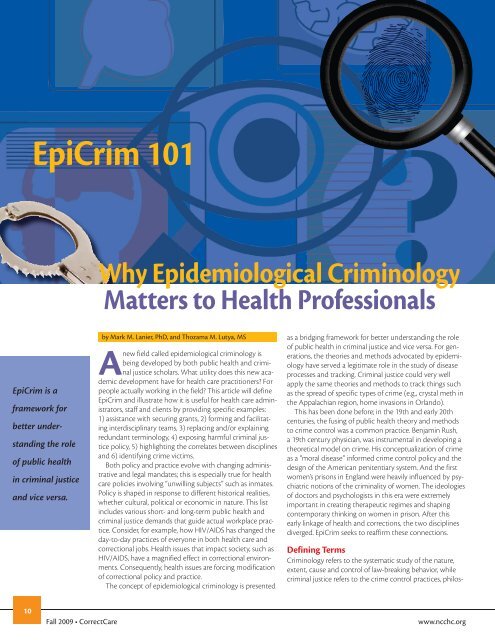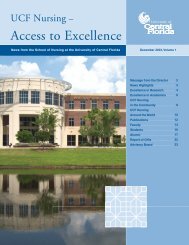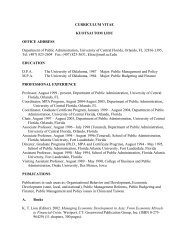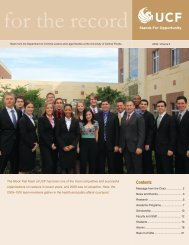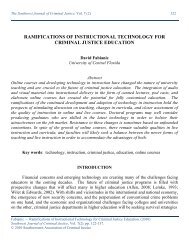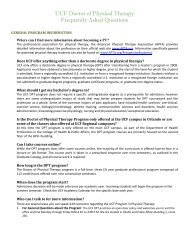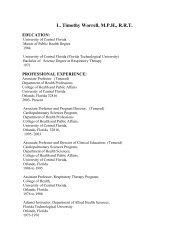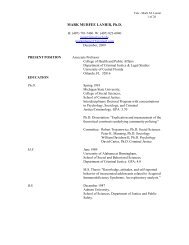EpiCrim 101Why Epidemiological CriminologyMatters to <strong>Health</strong> Professi<strong>on</strong>alsEpiCrim is aframework forbetter understandingthe roleof public healthin criminal justiceand vice versa.by Mark M. Lanier, PhD, and Thozama M. Lutya, MSAnew field called epidemiological criminology isbeing developed by both public health and criminaljustice scholars. What utility does this new academicdevelopment have for health care practiti<strong>on</strong>ers? Forpeople actually working in the field? This article will defineEpiCrim and illustrate how it is useful for health care administrators,staff and clients by providing specific examples:1) assistance with securing grants, 2) forming and facilitatinginterdisciplinary teams, 3) replacing and/or explainingredundant terminology, 4) exposing harmful criminal justicepolicy, 5) highlighting the correlates between disciplinesand 6) identifying crime victims.Both policy and practice evolve with changing administrativeand legal mandates; this is especially true for healthcare policies involving “unwilling subjects” such as inmates.Policy is shaped in resp<strong>on</strong>se to different historical realities,whether cultural, political or ec<strong>on</strong>omic in nature. This listincludes various short- and l<strong>on</strong>g-term public health andcriminal justice demands that guide actual workplace practice.C<strong>on</strong>sider, for example, how HIV/AIDS has changed theday-to-day practices of every<strong>on</strong>e in both health care andcorrecti<strong>on</strong>al jobs. <strong>Health</strong> issues that impact society, such asHIV/AIDS, have a magnified effect in correcti<strong>on</strong>al envir<strong>on</strong>ments.C<strong>on</strong>sequently, health issues are forcing modificati<strong>on</strong>of correcti<strong>on</strong>al policy and practice.The c<strong>on</strong>cept of epidemiological criminology is presentedas a bridging framework for better understanding the roleof public health in criminal justice and vice versa. For generati<strong>on</strong>s,the theories and methods advocated by epidemiologyhave served a legitimate role in the study of diseaseprocesses and tracking. Criminal justice could very wellapply the same theories and methods to track things suchas the spread of specific types of crime (e.g., crystal meth inthe Appalachian regi<strong>on</strong>, home invasi<strong>on</strong>s in Orlando).This has been d<strong>on</strong>e before; in the 19th and early 20thcenturies, the fusing of public health theory and methodsto crime c<strong>on</strong>trol was a comm<strong>on</strong> practice. Benjamin Rush,a 19th century physician, was instrumental in developing atheoretical model <strong>on</strong> crime. His c<strong>on</strong>ceptualizati<strong>on</strong> of crimeas a “moral disease” informed crime c<strong>on</strong>trol policy and thedesign of the American penitentiary system. And the firstwomen’s pris<strong>on</strong>s in England were heavily influenced by psychiatricnoti<strong>on</strong>s of the criminality of women. The ideologiesof doctors and psychologists in this era were extremelyimportant in creating therapeutic regimes and shapingc<strong>on</strong>temporary thinking <strong>on</strong> women in pris<strong>on</strong>. After thisearly linkage of health and correcti<strong>on</strong>s, the two disciplinesdiverged. EpiCrim seeks to reaffirm these c<strong>on</strong>necti<strong>on</strong>s.Defining TermsCriminology refers to the systematic study of the nature,extent, cause and c<strong>on</strong>trol of law-breaking behavior, whilecriminal justice refers to the crime c<strong>on</strong>trol practices, philos-10<str<strong>on</strong>g>Fall</str<strong>on</strong>g> 2009 • Correct<strong>Care</strong>www.ncchc.org
ophies and policies used by police, courts and correcti<strong>on</strong>s.Criminology is more c<strong>on</strong>cerned with theory (policy) whilecriminal justice is more c<strong>on</strong>cerned with practice.Public health is devoted to the preventi<strong>on</strong> and eradicati<strong>on</strong>of diseases that may infect communities. Epidemiologyis, above all else, a methodology. It is the study of variablesand factors that affect health. Epidemiology has traditi<strong>on</strong>allyserved as the foundati<strong>on</strong> for public health interventi<strong>on</strong>s.Epidemiology could be c<strong>on</strong>sidered policy while publichealth is practice.In our view, epidemiology/public health and criminology/criminal justice issues are closely related and often inseparable.EpiCrim is the merging of these disciplines. EpiCriminvolves the study of anything that affects the health of asociety, be it crime, flu epidemics, global warming, humantrafficking or HIV/AIDS. C<strong>on</strong>sider the following examplesthat illustrate how health care professi<strong>on</strong>als may benefitfrom EpiCrim.Hepatitis C, tuberculosis, aging pris<strong>on</strong> populati<strong>on</strong>s andsubstance abuse are just a few of the health issues that arestraining and subsequently altering correcti<strong>on</strong>al policy andpractice worldwide. By necessity, public health is becominghighly important as a funding source, for technicalexpertise, for medical staffing and for policy making withincorrecti<strong>on</strong>al instituti<strong>on</strong>s. Numerous research reports andfunding trends have documented this health-mandatedchange. The Federal Bureau of Investigati<strong>on</strong> has even usedpublic health analogies.Furthermore, most destructive crime-related behaviorshave str<strong>on</strong>g ties to mental and physical health problems.For example, driving under the influence of intoxicatingsubstances is a destructive behavior that affects the mentaland physical capabilities of the driver. Interventi<strong>on</strong>s aimedat reducing this dangerous trend should c<strong>on</strong>sider mentaland physical factors c<strong>on</strong>tributing to the use of intoxicatingsubstances. Then a combinati<strong>on</strong> of criminological and publichealth factors may shed light <strong>on</strong> the reas<strong>on</strong>s behind thereas<strong>on</strong>s for drunk driving.How EpiCrim Benefits <strong>Health</strong> Professi<strong>on</strong>alsExample 1: Securing GrantsBecause it is difficult to separate the criminal justice andpublic health behavioral correlates, the interdisciplinarynature of many funded research projects should comeas no surprise. In fact, the <str<strong>on</strong>g>Nati<strong>on</strong>al</str<strong>on</strong>g> Institutes of <strong>Health</strong>’s“Roadmap Initiative” encompasses not <strong>on</strong>ly the biomedicalsciences, but also their relati<strong>on</strong>ship to the epidemiological,behavioral and social sciences. What percentage of yourfunding is grant-related or agency-dependent? Having anew, solid and exciting theoretical basis for grant proposalsgreatly strengthens their odds of being funded.Example 2: Interdisciplinary Collaborati<strong>on</strong>EpiCrim encourages a paradigm under which disciplinaryboundaries are blurred or even eradicated. Whileother scholars have made linkages between health andcriminology, we seek to clarify and expand <strong>on</strong> what theyhave observed. HIV/AIDS and other health maladies havebeen examined by interdisciplinary teams combiningpublic health, medicine and criminology for over 20 years.However, most prior c<strong>on</strong>necti<strong>on</strong>s have dealt with specificproblems. EpiCrim is by nature interdisciplinary and soallows correcti<strong>on</strong>al and health care workers a comm<strong>on</strong>ground as opposed to the traditi<strong>on</strong>al custody vs. healthcare c<strong>on</strong>flicts. This blending of disciplines should reduce theinherent c<strong>on</strong>flicts.Example 3: Sharing Terminology<strong>Health</strong> care professi<strong>on</strong>als and criminal justice workers oftenfocus <strong>on</strong> the same issues and use similar approaches, butthey view things through different lenses and use differentlexic<strong>on</strong>s. For example, when criminal justice professi<strong>on</strong>alstalk about addressing the “root causes” of crime, they meanthe same thing as “primary care” to health professi<strong>on</strong>als.Likewise, “tertiary care” is analogous to specialized communitypolicing units. Each discipline can learn from eachother and increase its capacity by recognizing the comm<strong>on</strong>alityin approaches, methods and techniques.In illustrati<strong>on</strong>, factors that increase epidemics such asHIV/AIDS are entwined with factors c<strong>on</strong>tributing to sexualexploitati<strong>on</strong> of women and girls. Violence toward womenaffects their physical, sexual and reproductive health.Substance abuse is likely to diminish inhibiti<strong>on</strong>s, drivingusers to commit crimes such as rape, intimate partner violenceand child abuse. An EpiCrim approach identifies theseinterc<strong>on</strong>nected factors and encourages development of“primary care” strategies to prevent the root causes.Example 4: Exposing Harmful PolicySome criminal justice policies may actually harm publichealth care efforts. One c<strong>on</strong>vincing argument is that currentlaw and law enforcement strategy promulgate, rather thanreduce, drug abuse in America. These policies implicitly,and unknowingly, incorporate elements of public healthand criminological theory. By making these linkages explicit,an EpiCrim approach may reveal to policy makers thatmany criminals may benefit more from less criminal justiceinterventi<strong>on</strong>. This approach would also be useful in reassessingcounterintuitive policies such as prohibiti<strong>on</strong>s againstneedle-exchange programs and c<strong>on</strong>doms in pris<strong>on</strong>.Similarly, the prosecuti<strong>on</strong> of human traffickers throughcriminal justice channels <strong>on</strong>ly is not likely to reduce theoccurrence of this crime. In South Africa, women and girlsare more often trafficked by family members than by organizedgangs. Reas<strong>on</strong>s for this include children left behind byparents who have died of HIV/AIDS-related diseases, unemploymentof primary caregivers, lack of finances to sustainlarge families and absolute poverty. Prosecuting traffickersthrough criminal justice processes may be the least likelymeans to prevent this crime.Example 5: Highlighting CorrelatesAs disciplines such as criminology, psychology, publichealth and sociology became more specialized, scientistsbegan looking within their own fields and few externalmethods and approaches were used to help explainc<strong>on</strong>tinued <strong>on</strong> page 12www.ncchc.org<str<strong>on</strong>g>Fall</str<strong>on</strong>g> 2009 • Correct<strong>Care</strong>11


